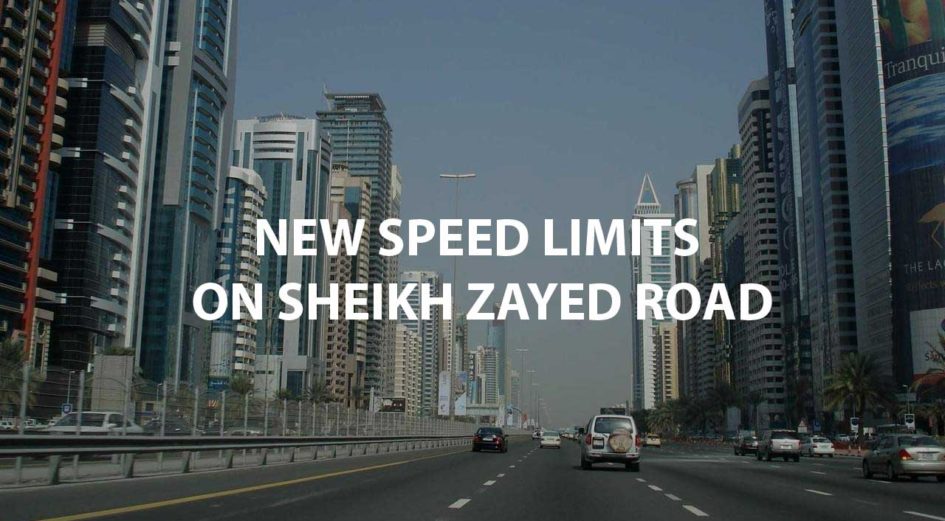Speed limits on both Sheikh Zayed Road and Emirates Road reduced to 110 Kmph
Watch out everybody! The speed limits are being reduced to 110km per hour on two major Dubai roads in a bid to curb accidents and improve safety.
Starting October 15 the speed limits on both Sheikh Zayed Road and Emirates Road will be reduced.
It is the latest road safety initiative deployed by authorities, and follows a public consultation to consider scrapping the existing 20kmph buffer afforded to speeding drivers, before risking a fine.
Statements from the RTA regarding the new speed limit
A joint operation between Dubai Police and the Roads and Transport Authority found both highways were carrying large volumes of traffic and have become hotspots for accidents and collisions.
“Lowering the speed limits on the Sheikh Mohammed bin Zayed and Emirates Roads is a result of elaborate traffic safety studies and analyses of traffic accident data along with their causes over the past years,” said Maitha bin Adai, chief executive of the RTA traffic and roads agency.
“It resulted in addressing several traffic safety requirements such as pedestrian bridges, safety rails, and truck lay-by areas; which contributed to realising RTA’s vision.
“The decision is mainly intended to curb traffic accidents resulting from over speeding, especially as the two roads witness huge volumes of heavy vehicles traffic in both directions.”
In the first six months of 2017, six people lost their lives and 78 more were injured in 99 accidents on Sheikh Mohammed bin Zayed Road.
The previous year saw 33 deaths and 249 injuries as a result of 196 accidents on the same stretch of road.
Emirates Road has suffered similar rates of serious road traffic accidents. During the first half of 2017, there were 10 road deaths and 75 injuries resulting from 40 accidents. In 2016, Emirates Road was the scene of 86 accidents in total that caused 29 deaths and 147 injuries.
“Controlling the speed limits is one of the most effective measures of reducing traffic accidents,” said Mr bin Adai.
“The procedure of controlling the speed limits is based on several criteria highlighted by the design speed of the road, and the actual speed observed by the majority of drivers.
“It also rests on the extent of urbanisation on both roadsides, pedestrian traffic, availability of schools, mosques and other vital facilities, and depends on the level of traffic accidents on the road, traffic volume, and the high probability of serial accidents.”
Research into several areas showed some areas were more prone to accidents than others, with corrective measures taken in line with Dubai’s speed management guide.
The RTA said speed limits to be enforced by radar cameras will soon yield a reduction in fatal incidents on both roads.
“This will step up the safety of users of both roads, as speed is a key contributing or associated factor for not less than 60 per cent of traffic road fatalities,” said Maj Gen Advisor Mohammed Saif Al Zaffein, Assistant Commander-in-Chief of Dubai Police.
“The move is compatible with the Dubai Police strategy aimed at reducing traffic accidents to zero percent per 100 of the population.”
According to the global competitiveness report issued by Davos Economic Forum, the UAE has achieved a top ranking in its road quality in the past four years.
Independent UK consultants at the Centre for Economics and Business Research (CEBR), also ranked UAE roads as number one, followed by Singapore and Hong Kong.
Other recent measures to improve road safety include compulsory checks on imported second hand cars.
The Emirates Authority for Standardisation and Metrology has outlawed the import, registration and insurance of vehicles that have been written off in other countries.
And similar pilot project by the Abu Dhabi Quality and Conformity Council now rates garages and workshops to help helping improve safety standards.
(Source : The National, Link to the original article : https://www.thenational.ae/uae/speed-limit-reduced-on-mohammed-bin-zayed-road-and-emirates-road-in-dubai-1.628167)


 Facebook
Facebook Twitter
Twitter Instagram
Instagram Youtube
Youtube